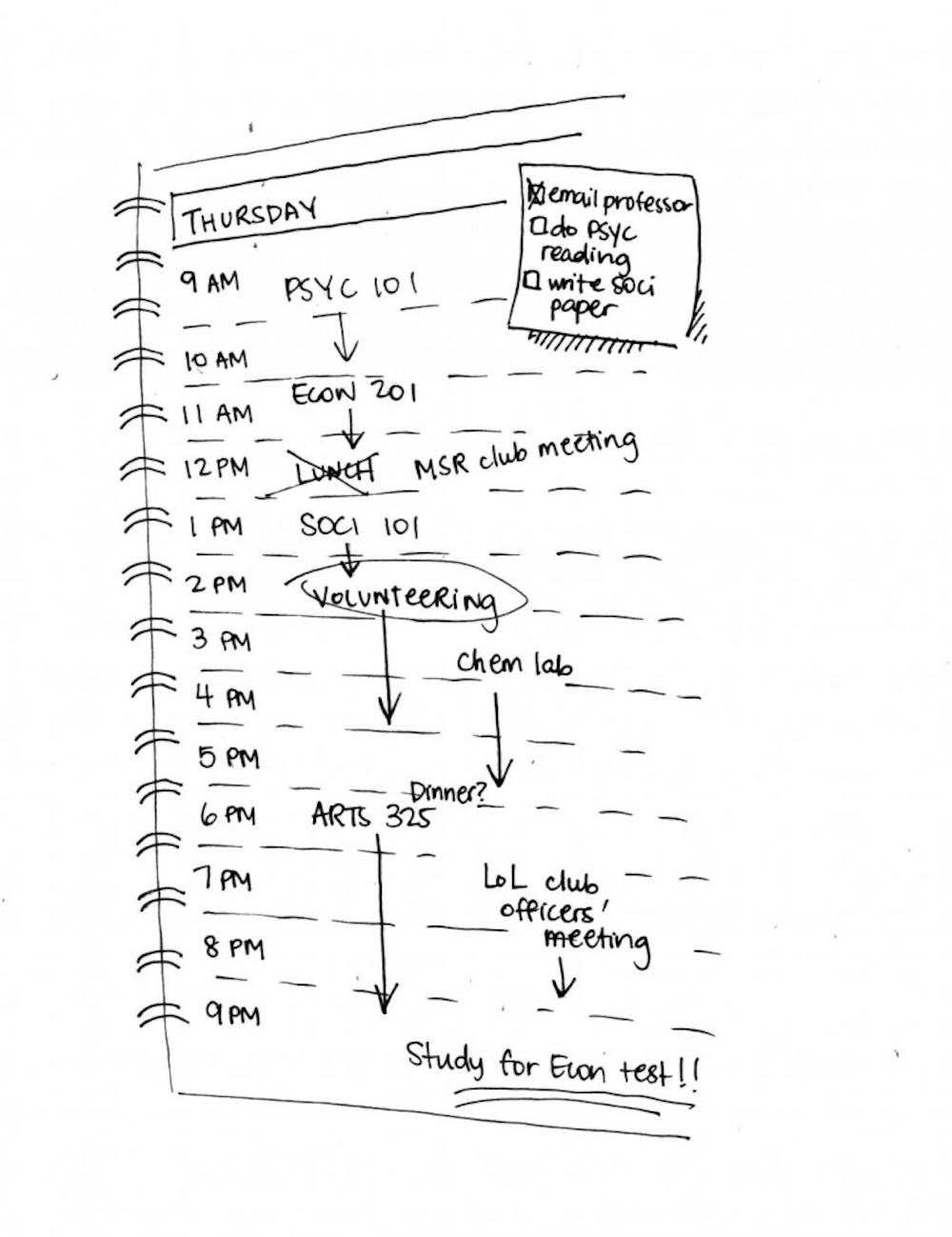Campus involvement should be deep, not broad

An imagined student schedule
Two weeks into the semester, I was sitting on McMurtry College’s fifth floor, on the verge of tears as I told my friend I felt overwhelmed. “You’re just ‘Sophomore-Tina’ again,” my friend told me. He had confirmed my suspicion that I was overcommitting again. Sophomore-me spread herself too thin due to a combination of exploring too many interests and having a fear of missing out. As I sat on McMurtry fifth, I knew I did not want to revert to my overcommitted sophomore-self. The next afternoon, I made a difficult decision and withdrew from a research opportunity.
Unfortunately, overcommitment is normal at Rice. Rice students live in a culture where being busy is applauded and encouraged. One application for a Rice opportunity requested me to list my top three to five activities, which suggests being involved in multiple organizations is the norm at Rice. Many students are overcommitted and cannot thrive as a result. We must stop this culture of overcommitment.
One junior social sciences major told me that during her sophomore year, between working on campus, serving on three committees for her residential college and on the executive board for a club, directing a new organization and still double majoring, she would go to bed around four o’clock in the morning and get up anywhere from six to eight o’clock to start the cycle all over again, her health suffering as a result. During the first week of classes, a senior social sciences major told me because she was stressed, she did not eat and sleep enough and lost seven pounds due to her academic, extracurricular and social commitments.
A senior engineering major told me his ambition for academic challenge, mishaps in planning ahead and not dropping any commitments, as well as his passion for helping others, led him to being currently overcommitted for both academics and extracurriculars.
We can blame pressure, comparison or the desire to do it all. It does not change the result, which is, when we overcommit, we neglect important aspects of our lives, be it our happiness, sleep or academics. Suddenly, we accept we are not doing the readings for a class, or that we are only sleeping four hours a night.
I think there are two categories of involvement: “light” commitments and “heavy” commitments. For instance, on paper I’m at 20 credit-hours, but two hours finished in the summer, one hour only meets three times a semester, one is for the college course I’m teaching and another is a statistics lab.
My “heavy” commitments are those 15 core credit-hours, the Thresher and teaching my class. I have two “light” commitments, meaning, I do not have leadership positions in these organizations, and I do not have to do things for them on a weekly basis.
At the end of last semester, a good friend told me she takes 20 credit-hours each semester because tuition is a flat rate, and she wants to get her money’s worth. Striving to “get your money’s worth” or “get your time’s worth” is based in flawed reasoning. Having a load like 20 credit-hours means we are not learning to full capacity in each class.
One of my professors told me this type of reasoning is like buying the 16-gallon pack of ice cream deal at Costco, because you want to get your money’s worth on ice cream. Each class has a lower average cost in nominal terms, but you are spending a greater amount and getting less out of it. Sure, you’re winning on marginal benefit, but at what personal cost?
More from The Rice Thresher
This moment may be unprecedented — Rice falling short is not
In many ways, the current landscape of American higher education is unprecedented. Sweeping cuts to federal research funding, overt government efforts to control academic departments and censor campus protests and arbitrary arrests and visa revocations have rightly been criticized as ushering in the latest iteration of fascism.
This moment may be unprecedented — Rice falling short is not
In many ways, the current landscape of American higher education is unprecedented. Sweeping cuts to federal research funding, overt government efforts to control academic departments and censor campus protests and arbitrary arrests and visa revocations have rightly been criticized as ushering in the latest iteration of fascism.
Obituary for D’Brickashaw Eagleclaw Ibarra
D’Brickashaw Eagleclaw Ibarra, nicknamed DEI, has transitioned to the ancestral plane.


Please note All comments are eligible for publication by The Rice Thresher.